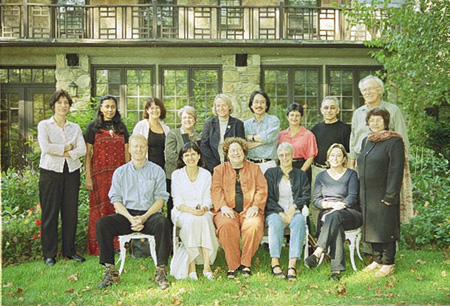Workshop on Suffering and Recovery
Date
Sep 17-17, 2002Organized by
Virginia R. Dominguez, and Richard Fox,Location
Troutbeck Inn, Amenia, NYParticipants
- Veena Das Johns Hopkins U., USA
- Virginia R. Dominguez U. Iowa, USA
- Maja Povrzanovic Frykmann U. Malmö, Sweden
- Richard Fox Wenner-Gren Foundation, USA
- Christine W. Gailey U. California-Riverside, USA
- Byron J. Good Harvard Medical School, USA
- Kirsten Hastrup U. Copenhagen, Denmark
- Ariel Heryanto U. Melbourne, Australia
- Jill E. Korbin Case Western Reserve U., USA
- Victoria Malkin Wenner-Gren Foundation, USA
- Cheryl Mattingly U. Southern California, USA
- Julie Peteet U. Louisville, USA
- Jane C. Schneider Graduate Center, City U. of New York, USA
- Nandini Sundar Jawaharlal Nehru U., India
- Richard Wilson New School U. and U. Sussex, UK
ORGANIZER’S STATEMENT: The Wenner-Gren Foundation convened an international workshop on “Suffering and Recovery” in Amenia, New York on the 17-20 September, 2002.. Virginia Dominguez, recently a member of the foundation’s advisory council, and Richard G. Fox assembled fourteen scholars to discuss the special methodologies and theories that anthropology could bring to the study of suffering and recovery. The intention was to try to define the unique contribution anthropology, by its concepts, could make to such significant public issues. Unlike the foundation’s international symposia, these workshops were not meant to produce conclusive statements or to result in a conference volume. The workshop on suffering and recovery therefore met the foundation’s objective by placing on the table a great variety of empirical instances and then by reviewing the anthropological work that had been done on them. Topics covered included universal human-rights discourse, global epidemiology, child labor, state-sponsored violence, cities “wounded” by violence or natural disaster, feeling the pain of victims of violence, ethnic pogroms, and forms of public apology like truth and reconciliation commissions. Participants considered how anthropological concepts like “culture,” “cultural relativism,” “everyday life,” and others supported or fettered the study of suffering and recovery, and they reviewed methodologies like “participant observation” or “multi-sited ethnography” in the same light. The workshop’s major accomplishment was to create new networks among scholars with a variety of anthropological perspectives all of whom are working on issues that are pertinent to a concept of suffering and recovery very broadly defined.
